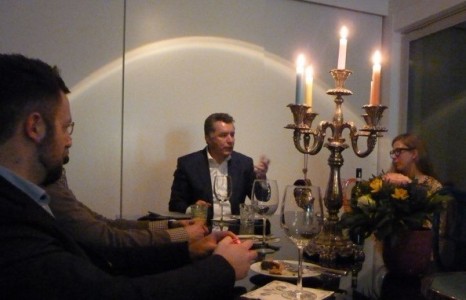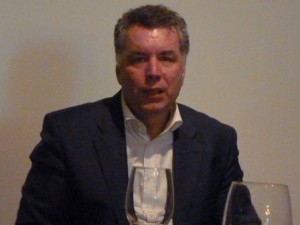
It was just a quirk of timing that United Europe’s first Alumni evening took place on the very same night that saw European leaders gather for yet another EU summit in Brussels. It was much less of a coincidence that both meetings focused on the refugee crisis. The arrival of millions of refugees and migrants in Europe has put a severe strain on Europe’s cohesion and solidarity.
“This crisis isn’t going to be over soon, and there aren’t any quick fixes” said German MEP Christian Ehler, a German member of the European Parliament who had been invited as keynote speaker to the March 7 alumni meeting in Berlin “During the next two or three years, we will have to exist in an emergency mode. We will need to make every effort to keep Europe from breaking apart.”
“We will have to strengthen our border controls, agree European asylum laws and support Turkey to help us,” Mr. Ehler continued. “We will have to do deals that we won’t like very much with the North African countries, too.”
Refugees are a big business
Mr. Ehler, a member of Chancellor Angela Merkel’s Christian Democratic Party, had been invited by Anne-Marie Grossmann, the host and organiser of this first alumni meeting of United Europe’s young professionals. It was she, too, who had suggested the topic of refugee policy in Europe.
In his speech, Mr. Ehler gave a fascinating insight into the economics and logistics of smuggling refugees into Europe, a topic that he has also just published a book on (“Long March for Europe” by Christian Ehler and Lea von Martius).
Smuggling people, Mr. Ehler explained, had become big business involving a globalised transport industry. All over the Turkish coast, there were criminal operations involved in the financial transactions: as a refugee, you would pay the bulk of your fee to one of these suspects with the money to be released step by step as you are being transported towards your destination.
A 20th century concept
Other countries were benefiting from the smuggling economy as well, Mr. Ehler added. In Libya, for example, this trade was providing much-coveted income to rival militias. According to estimates, smuggling refugees into Europe now accounted for as much as a third of Libya’s GDP.

|“How do smugglers set their price for smuggling refugees into Europe? If you live in Lagos, Nigeria, how do you find out about how to get to Europe?” Mr. Ehler asked. “Social media as well as communication with other migrants en route or already in Central Europe play an important role in disseminating information and advertising transport. We need to understand that we aren’t looking at any kind of spontaneous mass event.”
In the 21st century, there wasn’t that much difference between political asylum seekers and economic migrants, Mr. Ehler added in a surprising twist. “If you think you should grant a family asylum in Europe because two of their children were killed in a war, should you not do the same for a family whose children starved because of mismanagement and corruption?”
Stay the course
In the debate, Mr. Ehler strongly backed Chancellor Merkel’s policies on refugees despite mounting criticism in Germany and Europe. Closing the borders would not fix the problem, Mr. Ehler warned. It would only damage the economy as companies relied on just-in-time deliveries across borders.
Any solution to the refugee crisis might take several years, Mr. Ehler said. The EU would have to continue its negotiations with Turkey, but also deal with countries like Libya, Tunisia, Morocco, and Algeria to stop the smuggling and repatriate refugees. Europe also needed a common asylum and migration system as well as a common border protection. Chancellor Merkel and her party would have to stay the course even if that meant losing the next elections.
For United Europe’s young professionals, it was an intensive and thought-provoking evening on what is possibly the most difficult issue currently facing Europe. The Berlin alumni plan to meet again in May to continue the discussion in form of a quarterly roundtable. To join the discussion, please contact for further detail.


